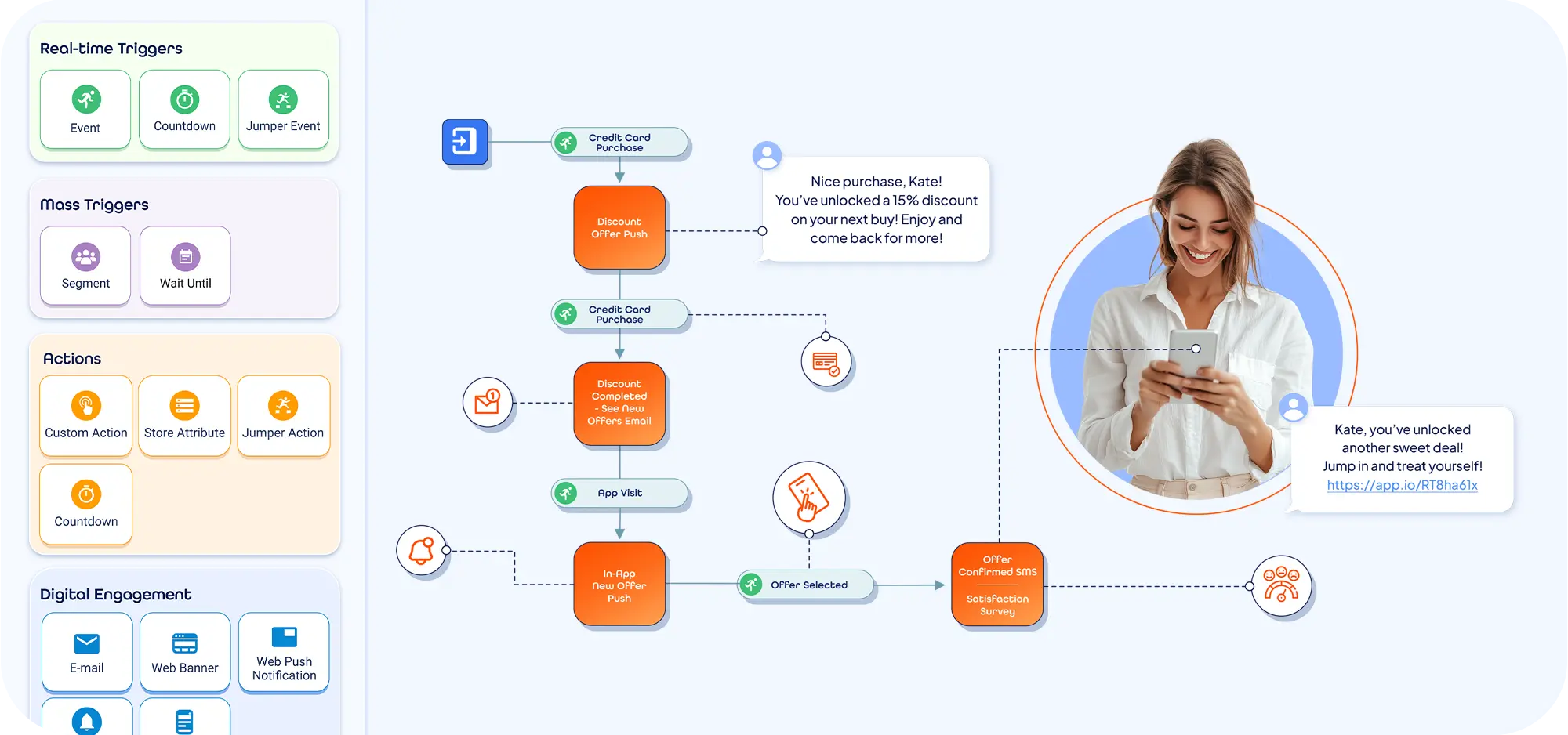Marketing Automation
What is Marketing Automation?
Marketing automation involves leveraging technology to streamline and enhance marketers’ efforts in reaching customers across diverse communication channels. By automating various marketing tasks, brands can effectively acquire, engage, retain, and monetize their audience.
This technology harnesses AI insights to perform customer segmentation based on intricate rules and customer behavior, which would otherwise be challenging to manage manually.
What are the Benefits of Marketing Automation?
The importance of marketing automation lies in its ability to enhance marketing efforts and drive overall business success. It empowers marketers to control every stage of the customer lifecycle, including onboarding, engagement, conversions, loyalty, retention, and reactivation.
Marketing automation also saves time by automating repetitive tasks, allowing marketers to focus on strategic activities like content creation and data analysis. It enables campaigns to be triggered across different devices and channels with greater success and reduced effort, a critical aspect as audience scale or messaging volume expands.
Furthermore, it facilitates lead nurturing through consistent and targeted communication, optimizing lead management with lead scoring and prioritization. Marketing automation platforms also provide reliable data and insights for making data-driven decisions and campaign optimization.

What are Examples of Marketing Automation?
Marketers can set up triggered emails to be sent based on specific user segments or actions.
Event-triggered emails are activated when a user takes an action, such as visiting a website, signing up for a membership, or making a purchase.
Segment-triggered emails are dispatched when a customer meets specific criteria. For example, if a customer hasn’t interacted with the brand in over a month, they can receive an email with personalized offers to encourage re-engagement and increase customer retention.
Key features of email marketing automation include drip campaigns, personalization, and A/B testing.
2. Social Media Marketing Automation
Social media automation tools empower marketers to schedule posts and track customer engagement. Additionally, they can monitor keywords, brand mentions, and trends across multiple platforms, allowing for the brand to engage with audiences in real-time.
3. Mobile Marketing Automation
Mobile marketing automation can be achieved through tactics such as automating in-app messages, SMS, and push notifications.
In-app messages are sent when users are actively engaging with the brand’s mobile app. They’re ideal for increasing real-time customer interactions.
SMS can be dispatched automatically based on user actions, demographics, or location via geofencing. Text messages typically have high open-rates.
Push notifications are sent to users’ mobile device screens, such as their computers, phones, tablets, and smart accessories. Push notification marketing often yields high visibility rates.
4. Lead Scoring and Nurturing
Lead scoring automation helps prioritize leads based on engagement and likelihood of conversion. By tracking behaviors like email opens, clicks, website visits, and interactions with content, marketers can assign scores to leads and tailor follow-ups.
5. CRM Integration
Marketing automation is often linked with Customer Relationship Management (CRM) systems to streamline data and enhance personalization. CRM integration automates actions such as lead management, personalized outreach, and data syncing.
6. Web Personalization Automation
Website content can be automated to display personalized offers or dynamic elements based on a visitor's past actions, location, or browsing history. Web personalization automation also allows for triggering pop-ups or banners that offer discounts, resources, or relevant content depending on user behavior.
7. Ad Campaign Automation
Ad automation allows marketers to optimize paid ads across multiple platforms by dynamically generating ad variations based on audience behavior and adjusting bids automatically to maximize ROI. It also enables retargeting, ensuring that ads are shown to users who have previously interacted with a brand or website, increasing the chances of re-engagement.
8. Content Marketing Automation
Content marketing automation involves distributing content across various marketing channels while targeting the right audience at the right time. Main features include content scheduling, curation, and performance tracking.
The Role of a Marketing Platform in Marketing Automation
The functionality of marketing automation revolves around employing a marketing technology platform to automate marketing tasks and workflows, thereby streamlining the overall process. It begins by gathering customer data from touchpoints such as website visits, social media interactions, and purchases. This data is then segmented based on criteria like demographics and behavior to facilitate targeted and personalized marketing campaigns.
Marketers design automated workflows with triggers and actions, such as sending welcome emails when a user signs up for a newsletter. Automated actions, including follow-up emails and personalized content delivery, are executed based on user interactions. The platform also tracks user behavior, providing valuable data for campaign performance analysis.
Unlocking the Potential of Marketing Automation with evamX
evamX is an omnichannel marketing platform that empowers businesses to form meaningful and long-lasting relationships with their customers. With its innovative modules such as Journey Designer and Digital Engagement, evamX allows for the design and automation of hyper-personalized and contextual customer journeys. Key features include:

Drag-and-Drop Interface: The user-friendly interface is intuitive and decreases marketing teams’ dependency on IT support.
Smart Segmentation: The platform segments audiences not just based on demographics, but also user behaviors, past purchasing patterns, location, and preferences.
Gen AI Capabilities: With AI-driven content creation, it’s possible to craft hyper-personalized messages that resonate with customers and boost customer engagement.
Real-Time Performance Monitoring: Immediate access to campaign metrics empowers businesses to adjust marketing strategies in real-time.
Join the Evam Community
Subscribe to receive the latest insights, news, and updates straight to your inbox.


